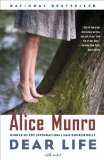Summary | Excerpt | Reading Guide | Reviews | Beyond the Book | Readalikes | Genres & Themes | Author Bio

Stories
by Alice Munro
No?
No.
Greta should have realized that this attitude—hands off, tolerant—was a blessing for her, because she was a poet, and there were things in her poems that were in no way cheerful or easy to explain.
(Peter's mother and the people he worked with—those who knew about it—still said poetess. She had trained him not to. Otherwise, no training necessary. The relatives she had left behind in her life, and the people she knew now in her role as a housewife and mother, did not have to be trained because they knew nothing about this peculiarity.)
It would become hard to explain, later on in her life, just what was okay in that time and what was not. You might say, well, feminism was not. But then you would have to explain that feminism was not even a word people used. Then you would get all tied up saying that having any serious idea, let alone ambition, or maybe even reading a real book, could be seen as suspect, having something to do with your child's getting pneumonia, and a political remark at an office party might have cost your husband his promotion. It would not have mattered which political party either. It was a woman's shooting off her mouth that did it.
People would laugh and say, Oh surely you are joking and you would have to say, Well, but not that much. Then she would say, one thing, though, was that if you were writing poetry it was somewhat safer to be a woman than a man. That was where the word poetess came in handy, like a web of spun sugar. Peter would not have felt that way, she said, but remember he had been born in Europe. He would have understood, though, how the men he worked with were supposed to feel about such things.
That summer Peter was going to spend a month or maybe longer in charge of a job that was being done at Lund, far up, in fact as far as you could go north, on the mainland. There was no accommodation for Katy and Greta.
But Greta had kept in touch with a girl she used to work with in the Vancouver library, who was married now and living in Toronto. She and her husband were going to spend a month in Europe that summer—he was a teacher—and she had written Greta wondering if Greta and her family would do them a favor—she was very polite—by occupying the house in Toronto for part of that time, not letting it stand empty. And Greta had written back telling her about Peter's job but taking up the offer for Katy and herself.
That was why they were now waving and waving from the platform and from the train.
There was a magazine then, called The Echo Answers, published irregularly in Toronto. Greta had found it in the library and sent them some poems. Two of the poems had been published, and the result was that when the editor of the magazine came to Vancouver, last fall, she had been invited to a party, with other writers, to meet him. The party was at the house of a writer whose name had been familiar to her, it seemed, for her whole life. It was held in the late afternoon, when Peter was still at work, so she hired a sitter and set off on the North Vancouver bus across Lions Gate Bridge and through Stanley Park. Then she had to wait in front of the Hudson's Bay for a long ride out to the university campus, which was where the writer lived. Let off at the bus's last turning, she found the street and walked along peering at house numbers. She was wearing high heels which slowed her down considerably. Also her most sophisticated black dress, zipped up at the back and skimming the waist and always a little too tight at the hips. It made her look somewhat ridiculous, she thought, as she stumbled slightly, along the curving streets with no sidewalks, the only person about in the waning afternoon. Modern houses, picture windows, as in any up-and-coming suburb, not at all the kind of neighborhood she had expected. She was beginning to wonder if she had got the street wrong, and was not unhappy to think that. She could go back to the bus stop where there was a bench. She could slip off her shoes and settle down for the long solitary ride home.
Excerpted from Dear Life by Alice Munro. Copyright © 2012 by Alice Munro. Excerpted by permission of Knopf, a division of Random House, Inc. All rights reserved. No part of this excerpt may be reproduced or reprinted without permission in writing from the publisher.
Your guide toexceptional books
BookBrowse seeks out and recommends the best in contemporary fiction and nonfiction—books that not only engage and entertain but also deepen our understanding of ourselves and the world around us.